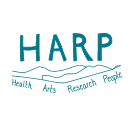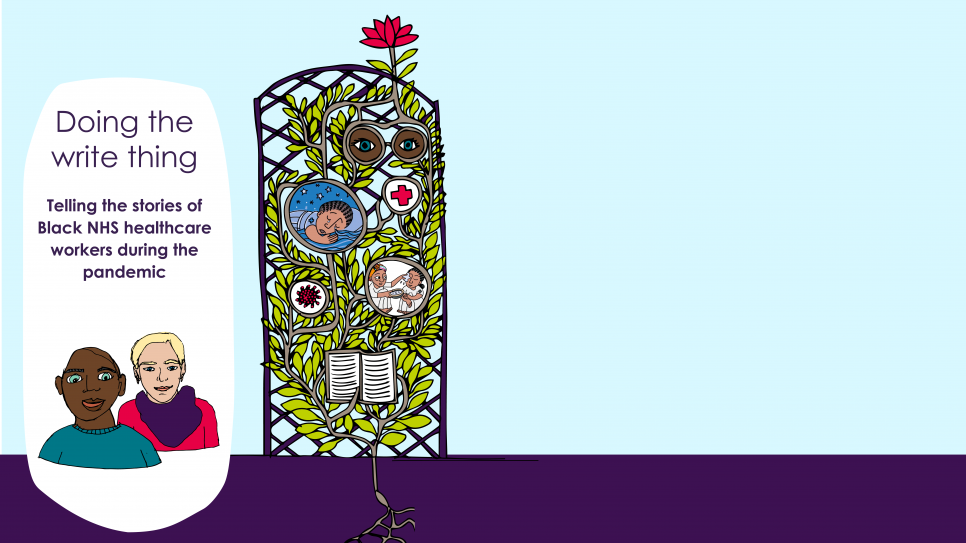Emma Kwaya-James, Inclusion Lead at Health Education and Improvement Wales, and Eric Ngalle Charles, a freelance artist, reflect on discovering the stories of Black NHS healthcare workers during the Covid-19 pandemic…
The events of 2020-21 – including COVID-19, the killing of George Floyd and the Black Lives Matter movement - highlighted to many that across the world, and on our doorstep in Wales, entrenched inequalities are present and remain within our society and neighbourhoods, particularly those endured by our Black community.
These entrenched inequalities were clearly present within the workforce of our beloved NHS, as we heard the news stories of Black people working in the NHS being more at risk from dying of COVID-19 than white people.
The empathy we felt for our Black colleagues motivated us and we believed storytelling could be a catalyst for change.
Working with Welsh artists with an African or Caribbean heritage, we sought to delve beyond the statistics to discover the stories of the Covid-19 pandemic from the perspective of Black NHS healthcare workers, healthcare students and trainees in Wales.
The Creative non-fiction method
Eric used a ‘creative non-fiction’ method to gather, synthesise and rewrite 10 stories. This involved presenting facts in the stories, but changing names and places, and mixing experiences across different stories so no individuals were identifiable in the final creative product.
This enabled us to provide a psychologically safe and confidential creative space. The ten stories are presented in an audiobook and we also created an animated video to introduce the work.
We wanted to provide Black healthcare workers with a unique and safe space to share their experiences of the pandemic. By doing this, we hoped participants would feel more valued and view the NHS as a welcoming place to work.
Our broader hope was that giving people a platform to share their experiences anonymously would help HEIW gain a better understanding of the perspectives of its diverse workforce during the pandemic. This could help inform its staff engagement work. The wider sharing with the public supports our society to learn from voices that exist on the periphery.
Using a creative non-fiction method provided a psychologically safe and confidential creative space
Lessons learned
The impact of the pandemic on Black healthcare workers’ health and wellbeing has been significant, and creative outlets to support wellbeing are important. Through this project, we witnessed the power of effectively engaging people with lived experience.
We also learned that those sharing personal experiences that may be traumatic must feel confident and comfortable enough to step forward and share concerns.
The creative non-fiction method was a unique and effective way to foster that confidence while staying true to the experiences and facts participants shared. Participants could feel safe sharing experiences and not fear retribution if they were identified.
Through the range of experiences participants shared, we saw that highlighting and celebrating individual identity can help work against the grouping together of people of ethnic minorities and communities under umbrella terms like ‘BAME’.
There is a power and importance to co-production and empowering people to be their own storytellers.
Looking to the future
These stories have been gathered for more than posterity, but to act as agents of change.
We believe these stories have the power to change current narratives and perceptions of Black people’s experiences
and that what we’ve learned can inform intelligent actions and achievement of strategic inclusion and workforce development plans, including how HEIW engages with the Welsh Government’s Race Equality Action Plan.
The creative outputs have been shared with the HEIW executive leadership team, who are now considering how the audiobook and stories can be shared more widely, including incorporating them into different training and development schemes to foster a deeper understanding of inequalities within the workforce.
The team is considering how it can share the stories more widely.
‘Doing the write thing’ was a HARP ‘Seed’ partnership between Health Education and Improvement Wales (Dee Udeze and Emma Kwaya-James) and freelance artists Ali Goolyad and Eric Ngalle Charles.

